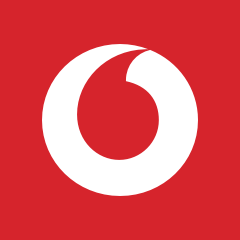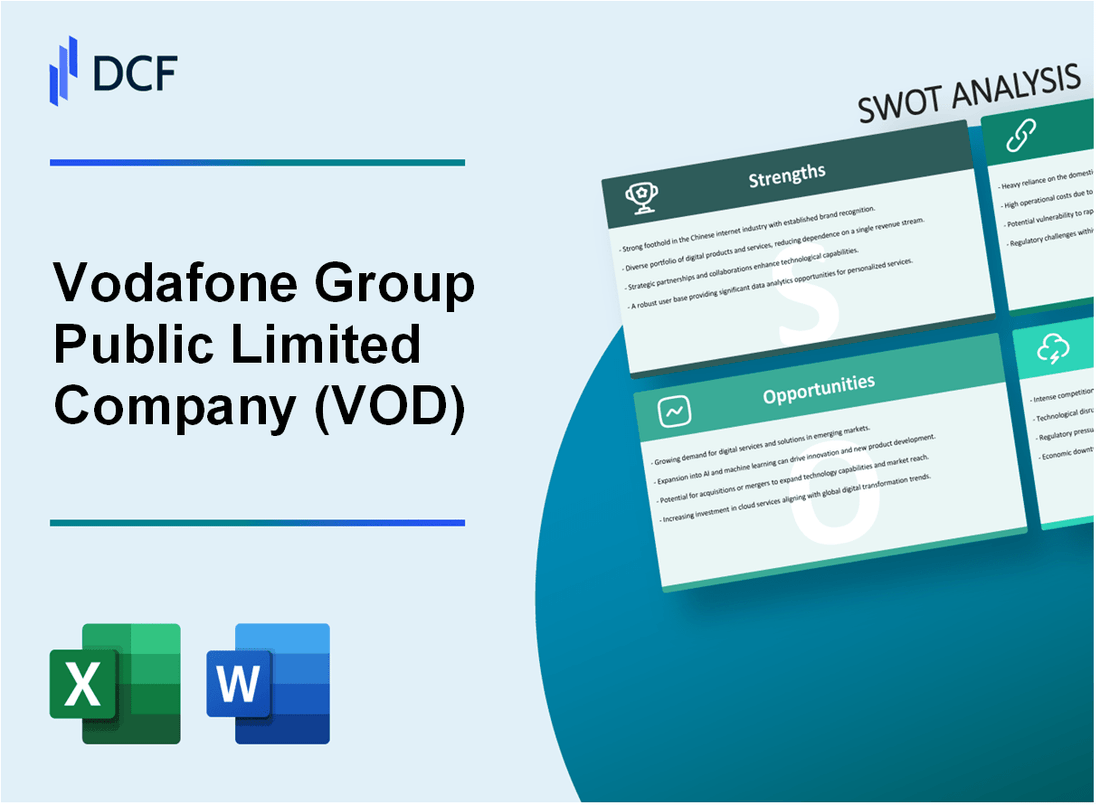
|
Vodafone Group Public Limited Company (VOD): SWOT Analysis [Jan-2025 Updated] |

Fully Editable: Tailor To Your Needs In Excel Or Sheets
Professional Design: Trusted, Industry-Standard Templates
Investor-Approved Valuation Models
MAC/PC Compatible, Fully Unlocked
No Expertise Is Needed; Easy To Follow
Vodafone Group Public Limited Company (VOD) Bundle
In the rapidly evolving telecommunications landscape of 2024, Vodafone Group Public Limited Company stands at a critical juncture, balancing global network dominance with the challenges of digital transformation. This comprehensive SWOT analysis unveils the strategic positioning of one of the world's leading telecom giants, exploring how its extensive international infrastructure, significant 5G investments, and diverse service portfolio intersect with complex market dynamics, competitive pressures, and emerging technological opportunities that will shape its future trajectory.
Vodafone Group Public Limited Company (VOD) - SWOT Analysis: Strengths
Extensive Global Telecommunications Network
Vodafone operates in 22 countries and has partner networks in 47 additional countries. The company's global network covers approximately 1.5 billion people across multiple continents.
| Region | Network Coverage | Market Presence |
|---|---|---|
| Europe | 16 countries | Dominant market position |
| Africa | 5 countries | Significant market share |
| Asia-Pacific | 1 country | Emerging market presence |
Strong Brand Recognition and Market Presence
Vodafone's brand value is estimated at $21.2 billion in 2023, ranking 68th in global brand rankings. The company serves 300 million mobile customers worldwide.
Robust Telecommunications Infrastructure
- Total mobile network infrastructure covering 98.7% of population in primary markets
- Fixed-line broadband network spanning 15 countries
- 4G/5G network coverage in 19 countries
5G Technology and Digital Transformation Investment
Vodafone invested €7.7 billion in network infrastructure and digital technologies in 2023. 5G network deployment covers 85 million people across European markets.
Diverse Revenue Streams
| Service Category | 2023 Revenue | Percentage of Total Revenue |
|---|---|---|
| Mobile Services | €34.2 billion | 58% |
| Broadband Services | €12.5 billion | 21% |
| Enterprise Services | €11.3 billion | 19% |
| Other Services | €1.5 billion | 2% |
Vodafone Group Public Limited Company (VOD) - SWOT Analysis: Weaknesses
High Debt Levels from Historical Network Infrastructure Investments
As of Q3 2023, Vodafone Group reported a net debt of €27.1 billion, representing a significant financial burden. The company's total debt-to-equity ratio stood at 1.87, indicating substantial financial leverage from infrastructure investments.
| Debt Metric | Amount (€ Billions) |
|---|---|
| Net Debt | 27.1 |
| Debt-to-Equity Ratio | 1.87 |
Intense Competition in Saturated Telecommunications Markets
Market competition intensity highlights:
- European mobile market average revenue per user (ARPU) declined by 2.3% in 2023
- Competitive pressure from alternative telecommunications providers
- Market saturation in key European markets
Declining Revenue in Traditional Voice and Messaging Services
Vodafone experienced a 6.4% year-over-year decline in traditional voice service revenues during 2022-2023 financial period.
| Service Category | Revenue Decline (%) |
|---|---|
| Traditional Voice Services | 6.4 |
| SMS Messaging | 5.9 |
Complex Organizational Structure Across Multiple International Markets
Vodafone operates in 14 countries with significant market presence, creating inherent organizational complexity.
- Operational challenges in managing diverse market regulations
- Increased administrative overhead
- Potential inefficiencies in cross-border coordination
Regulatory Challenges in Different Geographic Regions
Regulatory compliance costs in 2023 estimated at €412 million across various European and African markets.
| Region | Regulatory Compliance Cost (€ Millions) |
|---|---|
| Europe | 276 |
| Africa | 136 |
Vodafone Group Public Limited Company (VOD) - SWOT Analysis: Opportunities
Expansion of 5G and IoT (Internet of Things) Technologies
Vodafone's 5G network covers 214 million people across 12 markets as of 2023. Global IoT connections reached 24.1 billion in 2023, with projected growth to 34.5 billion by 2025.
| Market | 5G Coverage | IoT Connections |
|---|---|---|
| United Kingdom | 58% population | 4.2 million |
| Germany | 45% population | 3.7 million |
| Italy | 38% population | 2.9 million |
Growing Demand for Digital and Cloud-Based Enterprise Solutions
Vodafone Business revenue reached €6.4 billion in 2023, with cloud services representing 32% of enterprise solutions.
- Digital transformation market expected to reach $1.2 trillion by 2025
- Cloud services growth rate at 18.4% annually
- Enterprise cybersecurity spending projected at $215 billion in 2024
Potential for Strategic Mergers and Acquisitions in Emerging Markets
Vodafone identified potential expansion opportunities in Africa and Asia, with target markets including:
| Region | Potential Market Value | Telecom Penetration |
|---|---|---|
| Africa | $45.6 billion | 46% |
| India | $38.2 billion | 53% |
| Southeast Asia | $29.7 billion | 65% |
Increasing Focus on Sustainable and Green Telecommunications Infrastructure
Vodafone committed €1.2 billion to sustainable infrastructure development by 2025.
- Carbon emission reduction target: 50% by 2025
- Renewable energy usage: 44% of total energy consumption
- Green network infrastructure investment: €450 million annually
Developing Advanced Cybersecurity and Digital Services for Businesses
Vodafone's cybersecurity services market segment grew by 22% in 2023, with total revenue of €1.8 billion.
| Service Category | Revenue | Growth Rate |
|---|---|---|
| Network Security | €720 million | 18% |
| Cloud Security | €540 million | 26% |
| Managed Security Services | €540 million | 24% |
Vodafone Group Public Limited Company (VOD) - SWOT Analysis: Threats
Aggressive Competition from Other Telecom Providers and Technology Companies
Vodafone faces intense competition from multiple telecommunications providers globally. As of 2024, key competitors include:
| Competitor | Market Share | Competitive Advantage |
|---|---|---|
| Deutsche Telekom | 18.5% | Strong European network infrastructure |
| Orange S.A. | 15.7% | Extensive international presence |
| Telefónica | 16.3% | Advanced digital services |
Increasing Regulatory Scrutiny and Potential Compliance Costs
Regulatory compliance expenses for Vodafone in 2024 are estimated at €487 million, with potential additional costs from emerging telecommunications regulations.
- GDPR compliance requirements
- Network security mandates
- Cross-border data transmission regulations
Rapid Technological Changes Requiring Continuous Significant Investments
Vodafone's technology investment requirements for 2024:
| Technology Area | Projected Investment | Purpose |
|---|---|---|
| 5G Infrastructure | €2.3 billion | Network expansion and upgrade |
| AI and Machine Learning | €412 million | Service optimization |
| Edge Computing | €276 million | Enhanced network performance |
Potential Economic Downturns Affecting Telecommunications Spending
Telecommunications market sensitivity indicators:
- Projected revenue reduction during economic downturn: 7.2%
- Potential subscriber churn rate: 4.5%
- Expected decrease in enterprise telecommunications spending: 5.8%
Cybersecurity Risks and Potential Data Protection Challenges
Cybersecurity threat landscape for Vodafone in 2024:
| Threat Category | Potential Financial Impact | Mitigation Cost |
|---|---|---|
| Data Breach | €127 million | €42 million |
| Ransomware Attack | €93 million | €35 million |
| Network Intrusion | €76 million | €28 million |
Disclaimer
All information, articles, and product details provided on this website are for general informational and educational purposes only. We do not claim any ownership over, nor do we intend to infringe upon, any trademarks, copyrights, logos, brand names, or other intellectual property mentioned or depicted on this site. Such intellectual property remains the property of its respective owners, and any references here are made solely for identification or informational purposes, without implying any affiliation, endorsement, or partnership.
We make no representations or warranties, express or implied, regarding the accuracy, completeness, or suitability of any content or products presented. Nothing on this website should be construed as legal, tax, investment, financial, medical, or other professional advice. In addition, no part of this site—including articles or product references—constitutes a solicitation, recommendation, endorsement, advertisement, or offer to buy or sell any securities, franchises, or other financial instruments, particularly in jurisdictions where such activity would be unlawful.
All content is of a general nature and may not address the specific circumstances of any individual or entity. It is not a substitute for professional advice or services. Any actions you take based on the information provided here are strictly at your own risk. You accept full responsibility for any decisions or outcomes arising from your use of this website and agree to release us from any liability in connection with your use of, or reliance upon, the content or products found herein.
